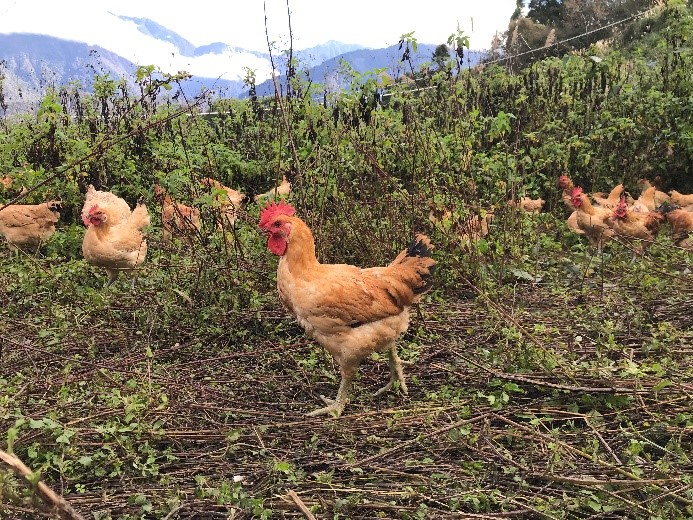信義布農族土雞品系調查、部落合作保種與委託飼養
臺大實驗林自2020年5月開始,藉由臺大校方支持的實驗林與鄰近鄉鎮共榮計畫,在南投縣信義鄉進行3項新的工作項目,包括協助在地信義原生土雞保種、與鄰近原住民部落合作飼養商業品種土雞,以及利用林下經濟段木香菇栽培所淘汰的廢棄段木飼養雞母蟲的循環經濟,已展現初步成果。
.jpg)
原生土雞保種項目 協助部落找回原有的養雞文化
在原生土雞保種項目,實驗林在2020年透過信義鄉居民協助取得6隻純系信義土雞,並在內茅埔營林區飼養、繁殖,為了保持雞群遺傳多樣性,也會與其他飼養信義土雞的養殖戶交換雞隻。適齡老雞多數銷售給在地居民,目前雞舍約有30隻雞。原生土雞雖然具有獨特風味,但因為飼養期較長,不符合商業效益,已漸漸在市場消失。本項目主要是為了協助留下在地原有的雞隻品種,也希望日後能推廣回原住民部落,協助部落找回原有的養雞文化。
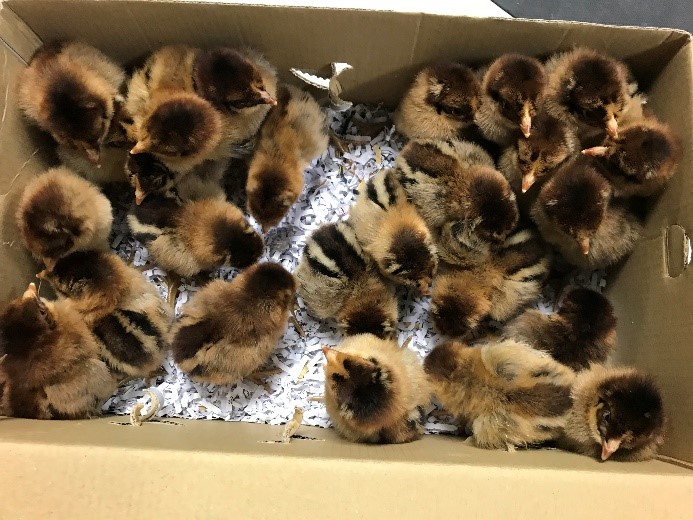
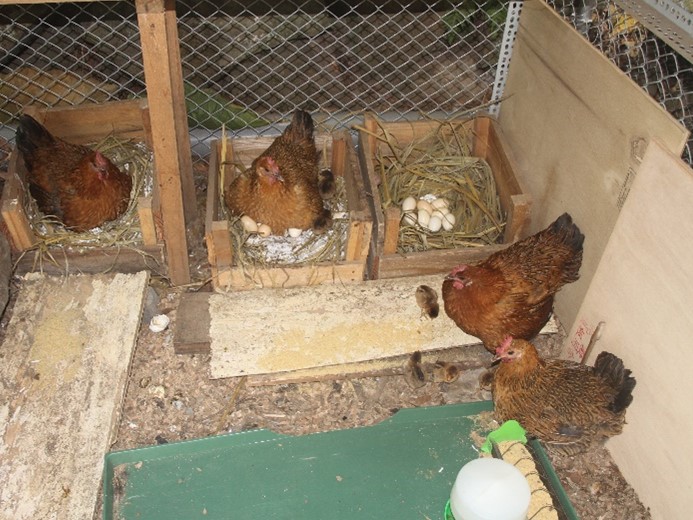
輔導飼養商業品種土雞 增加地方多元產業發展
飼養商業品種土雞方面,是由臺大實驗林、立瑞畜產公司以及轄區周邊原住民部落三方共同合作的。立瑞畜產公司是臺灣少數能從品種選育、飼養、屠宰、商品開發及產品加工一貫化作業的公司,並已經成功建立商業模式及自有品牌,因為公司董事長是臺灣大學EMBA總裁班學生,受到課程啟發,希望與臺大實驗林合作,實現大學及企業的社會責任。而養殖戶的部分,實驗林在2020年、2021年分別與信義鄉新鄉部落、羅娜部落原住民合作飼養雞隻,養殖戶都是信義鄉當地布農族小農,透過本項目,除了能增加雞農收入、也增加地方多元產業發展,並活化部落閒置空間。
.jpg)
在循環經濟上 創造廢棄段木的循環經濟價值
至於在循環經濟上,因為臺大實驗林內茅埔營林區辦理林下經濟段木香菇栽培示範區設置與推廣業務,每年都會有無法繼續生產香菇的段木被淘汰,過去只能放著腐朽,或提供附近居民廚灶生火使用。但將這些廢棄段木破碎成屑後,就能吸引自然界中的甲蟲來產卵,孵化的蟲(雞母蟲)以碎木屑為食物,可以餵食土雞作為蛋白質的補充,雞母蟲消化後的木屑也能更快地在林地裡被分解,創造廢棄段木的循環經濟價值。
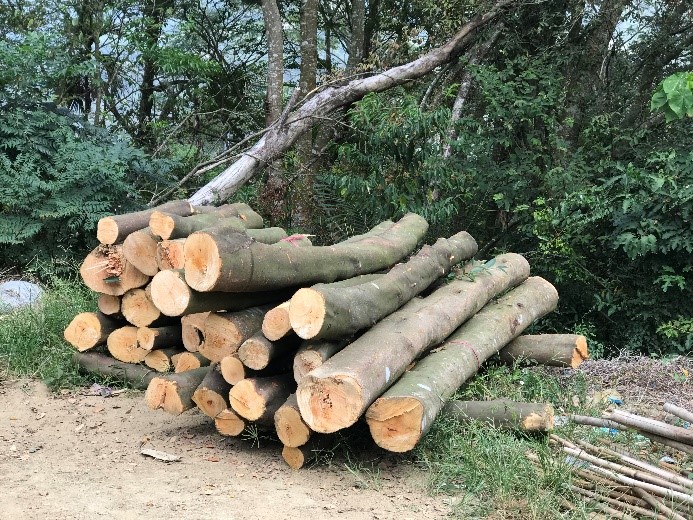
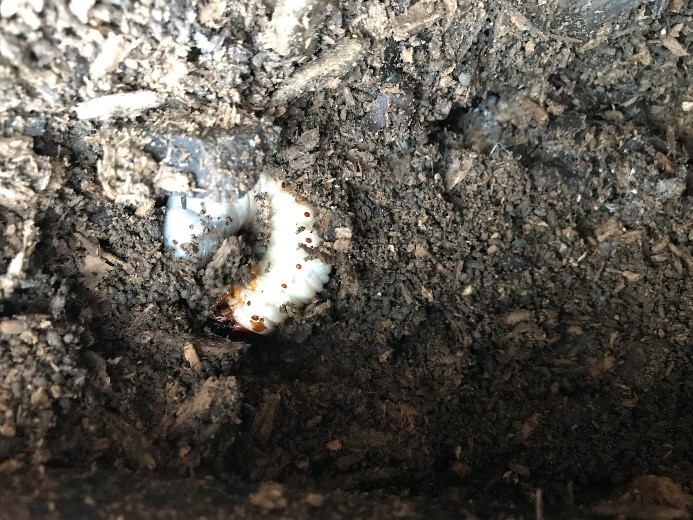
大學社會責任 輔導「信義700土雞」雞湯調理包上巿
而根據大學社會責任輔導生產的產品-「信義700土雞」,目前也已上巿:2020年5月,臺大實驗林引進約50隻立瑞畜產公司育成的新品種R02土雞,並交給轄區周邊的布農部落飼養。經過觀察,R02土雞可以適應山區氣候及放養環境,因此實驗林在2020年10月、2021年10月又分別引進了各約400隻R02雛雞,委託部落裡的養雞戶照顧雞隻。
R02土雞在信義鄉海拔約700公尺的部落裡自由生長,有充分的活動空間,呼吸清新空氣,享受充足日曬,飲用的水源也是引自臺大實驗林所管理的森林,還有均衡飲食且不施打或餵食抗生素。經過4個月的飼養期,當雞隻肉質成熟時,再交由符合HACCP、ISO22000標準的合格電宰及食品加工廠處理,製成兼具溫暖與養生的「信義700土雞」雞湯調理包。
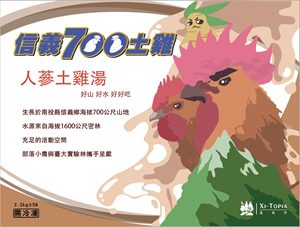
「信義700土雞」是集合臺大實驗林、立瑞畜產公司與信義鄉布農部落小農共同努力的成果。臺大實驗林也希望未來有機會繼續與具社會責任價值觀的企業和信義鄉原住民共同合作,創造共榮共享的三贏模式。
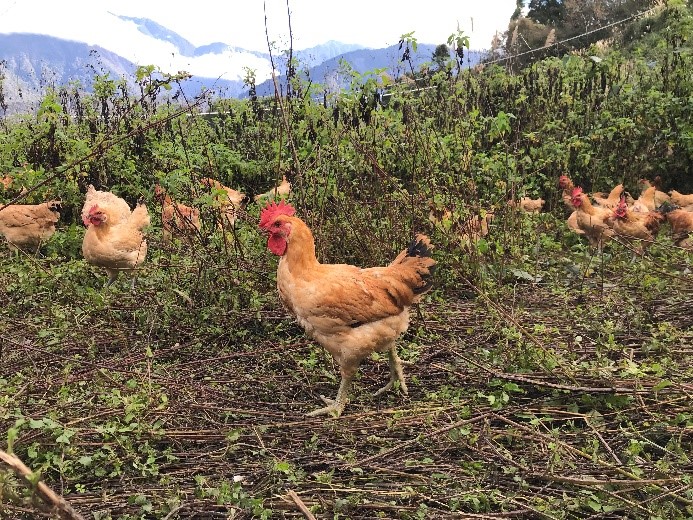
Achievement of 2021
Joint Efforts Program of the NTU Experimental Forest and Neighboring Communities
The NTU Experimental Forest has been striking to build mutual relationships with indigenous tribes in Xinyi Township, Nantou County for years. In 2020, the NTU Experimental Forest commenced a new project that was targeted to : (1) conserve true-breeding line of native chickens in Xinyi Township, (2) cooperate with neighboring indigenous tribes (the Bunun people) to raise native chickens for commercial channel, and (3) raise beetle larvae by taking advantage of tree logs used in cultivating log mushroom for under-forest economy and achieve circular economy.
.jpg)
In order to conserve native chicken breed in Xinyi Township, the NTU Experimental Forest obtained 6 true-breeding native chickens in 2020 and bred in Neimaopu District. To maintain genetic diversity, the NTU Experimental Forest also exchanged native chickens with local Xinyi native chicken breeders. Although the Xinyi native chickens have unique taste, they were not commercially profitable because of longer breeding period, thus declining in markets. Therefore, the NTU Experimental Forest aimed not only to conserve local native chickens but also to help indigenous tribes to restore the local culture of raising chickens.
The NTU Experimental Forest, Leadray Co., Ltd. and adjacent indigenous tribescollectively worked together on raising native chickens for commercial channels. Leadray Co., Ltd is one of few companies in Taiwan able to provide one-stop service including breeding, raising, butchering, product development and product processing, and it has successfully established its own business model and private brand. The president of Leadray Co., Ltd participated in EMBA in NTU, and was inspired by the course. Thereafter, the president were willing to team up with the NTU Experimental Forest to achieve both corporate social responsibility and university social responsibility. The NTU Experimental Forest entrusted native chickens to breeders in Sinapalan Tribe and Luluna Tribe in 2020 and 2021. Breeders were all local indigenous people of Xinyi Township. With the joint efforts, the NTU Experimental Forest help income increases of the chicken farmers anf thus improve the sustainable development of local tribes.
.jpg)
For circular economy, Neimaopu District has been promoting under-forest economy by means of tree-log mushroom cultivation. During tree-log mushroom cultivation, tree logs are gradually rotted by fungi and discarded. Discarded logs used to be treated as firewood or just left degraded naturally. However, if chipped, they attract beetles which laid eggs on them. Beetle larvae feeds on chips and are later served as protein supplements for the chickens. Moreover, chips digested by larvae are degraded more easily. From tree logs, chips nourish beetle larvae as supplements for the native chicken and achieve circular economy of forest resources.
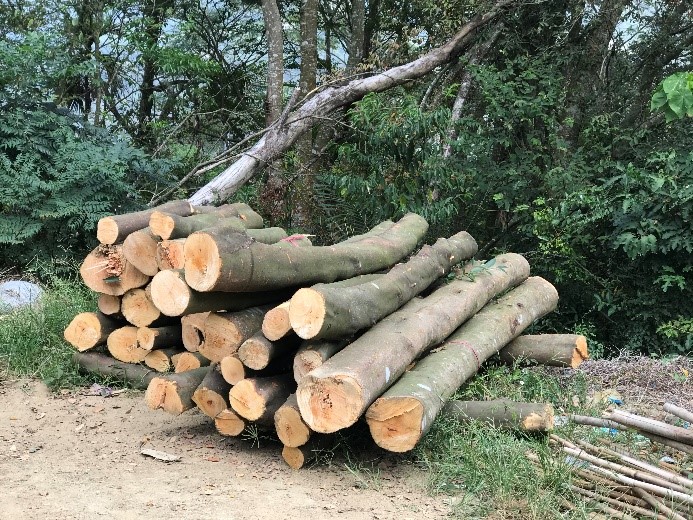
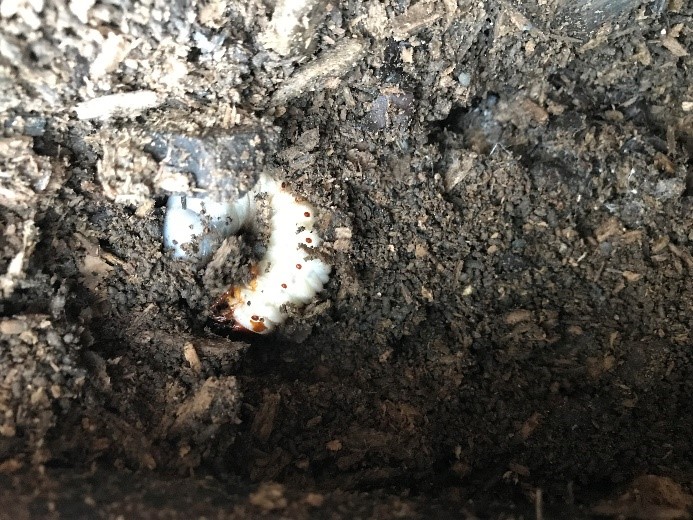
Xinyi 700 native chickens – an USR product
In May 2020, the NTU Experimental Forest introduced 50 R02 chickens (a commercial strain of native chickens which bred in Leadray Co., Ltd) to local farmers of adjacent Bunun tribes. these native chickens were able to adapt to mountainous climate and environment. Therefore, the NTU Experimental Forest further introduced 400 R02 chickens in October 2020 and October 2021 respectively and also sent them to local farmers in adjacent Bunun tribes.
Those R02 chickens were raised in tribes at elevation of 700 meter above sea level, and they grew in nearly free-range environment and enjoyed fresh air, clean water (which is derived from forest managed by the NTU Experimental Forest), balanced diet and no antibiotics. When chickens became mature after a 4-month breeding period, they were butchered and processed in legitimate companies complying with both ISO22000 and HACCP. Subsequently, they were made into healthy and tasty frozen chicken broth bags. The brand of these products is “Xinyi 700 Native Chicken”.
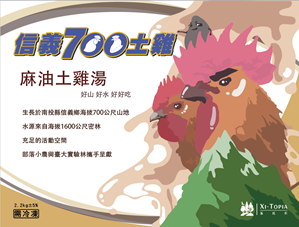
The Xinyi 700 Native Chicken is a joint effort by the NTU Experimental Forest, Leadray Co., Ltd and local chicken farmers in Bunun tribes in Xinyi Township. The NTU Experimental Forest is looking forward to cooperate with both socially-responsible enterprises and indigenous people in Xinyi Township and subsequently create a business model benefits all participants.
